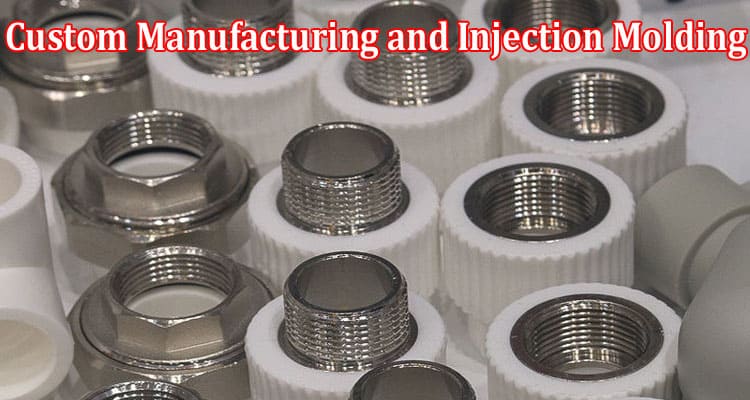Custom Manufacturing and Injection Molding: A Perfect Partnership for Startups
Custom manufacturing is a modern approach to production that allows for tailored specifications to cater to specific client needs, instead of relying on mass-produced, standard designs. On the other hand, injection molding is a traditional manufacturing method where molten materials, typically plastic, are injected into a mold to create parts or products. When combined, these two processes – custom manufacturing and injection molding – form a perfect partnership that can provide startups with affordable, efficient, and flexible production solutions.
For startups, particularly those in the manufacturing sector, forming strategic partnerships can have a transformative impact on their journey. Financial constraints and resource limitations often characterize the early stages of startup companies, making the cost-effectiveness and versatility of custom injection molding an ideal match. Moreover, a partnership with an established custom manufacturing and injection molding company can provide startups with invaluable industry insights, technical expertise, and access to advanced manufacturing technology without substantial upfront investment. This can significantly expedite time-to-market, enhance product quality, and promote innovation – vital components in driving competitive advantage and success in today’s fast-paced business landscape.
Introduction to Injection Molding
Injection molding is a ubiquitous manufacturing process in which a material, typically plastic, is heated until molten and then injected into a mold where it cools and solidifies into the desired shape. This technique has revolutionized the mass production of complex parts, enabling high precision and consistency on a large scale.
The process of custom injection molding service commences by feeding plastic pellets into a hopper. These pellets are guided into a heating cylinder, where heat and friction transform them into a molten state. Subsequently, the molten plastic is pressurized and injected into a metal mold cavity, conforming to its shape. Upon cooling, the plastic solidifies, maintaining the mold’s desired shape. Finally, the newly formed part is ejected from the mold, concluding the cycle and paving the way for a fresh start in the injection molding process.
Overview of Custom Manufacturing
Custom manufacturing, also known as bespoke or tailor-made manufacturing, refers to the production of goods designed and produced to meet the specific needs of a particular customer or client. Instead of a one-size-fits-all approach that is common with mass production, custom manufacturing focuses on delivering unique solutions based on individual requirements. This might involve variations in design, materials, dimensions, functionalities, or other characteristics that distinguish the product as uniquely suited for its intended use.
The concept of custom manufacturing centers around the principle of customer-centric production. It’s not just about manufacturing a product; it’s about crafting a solution that precisely fits the customer’s needs. Custom manufacturing is largely driven by advancements in technology such as CAD software and 3D printing, which allow for flexible design and rapid prototyping. This process is particularly beneficial in industries where uniqueness and differentiation are highly valued, such as automotive, aerospace, medical devices, and consumer electronics. By delivering customized solutions, businesses can provide added value to their customers, fostering deeper relationships and promoting brand loyalty.
Benefits for startups
Benefits for startups refer to the unique advantages that early-stage companies enjoy as a result of their lean structure, innovative approach, and ability to swiftly adapt to market changes. These benefits, often pivotal to the success and growth of startups, include tailored production, cost-effectiveness, flexibility, and scalability.
Tailored production
Startups have the opportunity to create highly customized products or services that cater to the specific needs and preferences of their target audience. By focusing on a niche or specialized market, they can develop innovative and unique solutions that larger companies may not be agile enough to pursue. This tailored approach helps startups differentiate themselves from competitors and establish a strong presence within their chosen market.
Cost-effectiveness
Startups typically have leaner operational structures, which allows them to optimize resources and minimize overhead expenses. By leveraging modern technology, like digital platforms and manufacturing techniques, they can achieve greater cost-effectiveness in their production and distribution processes. This efficient resource allocation enables startups to focus on growth and expansion, while still delivering high-quality products and services to their customers.
Flexibility and scalability
One of the most significant advantages of startups is their ability to adapt to changing market conditions, customer needs, and technological advancements. This flexibility allows them to quickly pivot their strategies, develop new offerings, or scale their operations as needed. Moreover, the scalability of startups enables them to grow rapidly when the opportunity arises, tapping into new markets and expanding their reach.
Advantages for startups
Startups can gain significant advantages by utilizing advanced manufacturing technologies, including:
Efficient production
Advanced manufacturing technologies enable startups to optimize their production processes, resulting in improved efficiency. Automation and modern machinery streamline manufacturing operations, reducing production time and costs. Startups can maximize resource utilization and meet growing demand efficiently, allowing them to scale their operations effectively.
High precision and repeatability
Precision is critical for startups aiming to deliver high-quality products. Advanced manufacturing technologies provide exceptional precision and repeatability, ensuring consistent and accurate production of components or products. This high level of precision minimizes errors, defects, and rework, resulting in improved product quality and customer satisfaction. Startups can establish a reputation for reliability and excellence in their respective industries.
Wide range of materials
Startups often needs to experiment with different materials to develop innovative products or prototypes. Advanced manufacturing technologies offer a wide range of materials to choose from, including metals, plastics, composites, and more. This versatility allows startups to explore new design possibilities, incorporate diverse functionalities, and create products tailored to specific market needs. The ability to work with various materials opens doors for creativity and differentiation, giving startups a competitive advantage.
The Synergy between Custom Manufacturing and Injection Molding
The synergy between custom manufacturing and injection molding stems from their complementary nature, which allows for the seamless integration of these processes to achieve optimal results. Custom manufacturing involves the creation of unique products tailored to specific customer requirements, while injection molding is a versatile and efficient manufacturing method that produces complex and precise plastic components.
By combining the strengths of these two processes, manufacturers can harness the benefits of customization and the cost-effective production capabilities of injection molding. The collaborative use of custom manufacturing and injection molding enables the production of highly customized, high-quality plastic parts and products, leading to enhanced product performance, improved customer satisfaction, and competitive advantages in various industries. This symbiotic relationship between custom manufacturing and injection molding unlocks new possibilities for innovation and efficient production, making it a valuable approach for manufacturers seeking to meet diverse customer needs and achieve manufacturing excellence.
Benefits of the partnership for startups
The partnership between startups and established manufacturing companies brings forth a multitude of benefits that contribute to the success and growth of startups. The advantages can be summarized in the following bullet points:
Streamlined production process
By collaborating with experienced manufacturing partners, startups can streamline their production process, ensuring efficient operations and optimized resource utilization. This allows startups to focus on their core competencies and accelerate their production capabilities.
Faster time-to-market
Partnering with established manufacturers provides startups with access to advanced manufacturing technologies, expertise, and a well-established supply chain. This results in reduced lead times, enabling startups to bring their products to market faster and gain a competitive edge in rapidly evolving industries.
Cost optimization
The partnership with manufacturing companies can help startups achieve cost optimization through economies of scale, shared resources, and expert knowledge in supply chain management. Leveraging the manufacturing partner’s existing infrastructure and production capabilities can lead to significant cost savings for startups.
Improved product quality
Established manufacturing partners bring their expertise in quality control and assurance, ensuring that startups can deliver high-quality products to their customers. Access to advanced manufacturing technologies and processes enables startups to achieve higher precision, consistency, and adherence to industry standards, thereby enhancing the overall product quality.
Choosing the Right Custom Manufacturing Partner for Startups
Choosing the right custom manufacturing partner is an essential task for startups embarking on the journey of bringing their innovative products to market. Startups face unique challenges during the manufacturing process, and finding a reliable and compatible manufacturing partner becomes paramount to their success. Thorough research and diligent evaluation are crucial in this selection process. Startups should assess potential partners based on their experience, expertise, and track record in producing similar products. It is vital to delve into their capabilities, production capacity, and quality control processes to ensure they can meet the startup’s specific manufacturing needs.
Furthermore, flexibility and responsiveness are key traits to consider, as startups often experience evolving requirements and timelines. Open communication channels and a collaborative approach are vital for a fruitful partnership. Proximity to the startup’s operations is worth considering, as it can facilitate logistics and communication, ultimately reducing lead times and potential challenges.
Additionally, the cost structure and pricing offered by potential manufacturing partners should align with the startup’s budget and overall business strategy. By carefully considering these factors, startups can make an informed decision and choose the right custom manufacturing partner that will serve as a solid foundation for their growth and success in the market.
Overcoming Challenges in Custom Manufacturing and Injection Molding
Overcoming challenges in custom manufacturing and injection molding requires a comprehensive understanding of the intricacies involved in the process. One common challenge is achieving precise and consistent product dimensions. Factors such as material selection, mold design, and process optimization play a critical role in ensuring accurate and repeatable results. Additionally, maintaining quality control throughout the manufacturing process is essential to avoid defects and inconsistencies. This includes rigorous inspection procedures, adherence to industry standards, and continuous monitoring of key parameters.
Another challenge is managing production costs effectively. Custom manufacturing and injection molding involve various expenses, such as tooling, materials, and labor. Finding the right balance between cost and quality requires strategic decision-making and careful planning.
Moreover, meeting production deadlines can be challenging due to unforeseen issues or delays in the supply chain. Effective project management, open communication with suppliers, and contingency plans can help mitigate these challenges. Lastly, staying up to date with advancements in technology and industry best practices is crucial for overcoming challenges in custom manufacturing and injection molding. Embracing automation, adopting innovative techniques, and investing in employee training can enhance efficiency and competitiveness. By addressing these challenges proactively, manufacturers can optimize their processes and deliver high-quality custom products to meet the diverse needs of their customers.
Conclusion
Custom manufacturing and injection molding form a perfect partnership for startups looking to bring their unique products to life. By leveraging the capabilities of custom manufacturing, startups can create tailored solutions that meet the specific demands of their target market. The flexibility and versatility of injection molding enable the production of complex and intricate designs with precision and consistency. This partnership allows startups to overcome the challenges typically associated with manufacturing and deliver high-quality products efficiently.
Moreover, the scalability of injection molding empowers startups to adapt to growing demands and achieve economies of scale as their business expands. By harnessing the potential of custom manufacturing and injection molding, startups can unlock new opportunities, differentiate themselves in the market, and lay the foundation for long-term success.



